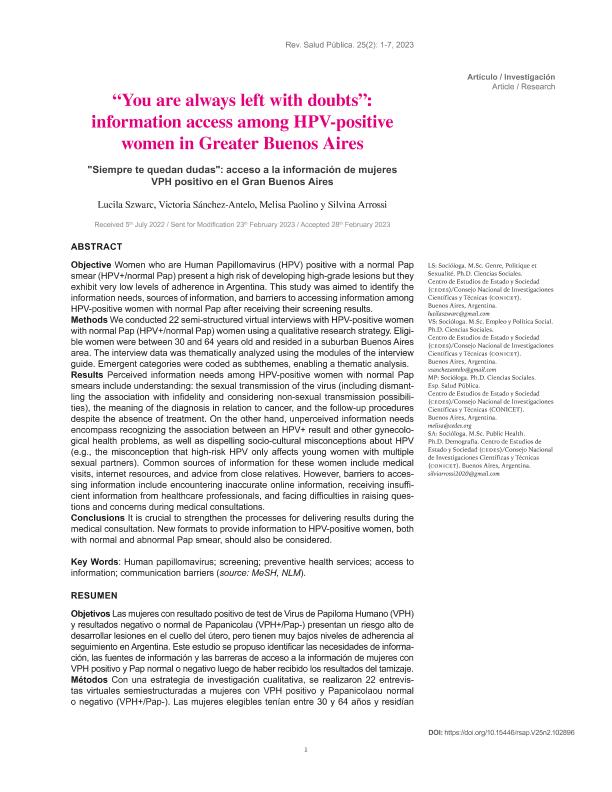Mostrar el registro sencillo del ítem
dc.contributor.author
Szwarc, Lucila

dc.contributor.author
Sánchez Antelo, Victoria Inés María

dc.contributor.author
Paolino, Melisa Delia

dc.contributor.author
Arrossi, Silvina

dc.date.available
2023-11-28T15:57:08Z
dc.date.issued
2023-01
dc.identifier.citation
Szwarc, Lucila; Sánchez Antelo, Victoria Inés María; Paolino, Melisa Delia; Arrossi, Silvina; "Siempre te quedan dudas": Acceso a la información de mujeres VPH positivo en el Gran Buenos Aires; Universidad Nacional de Colombia; Revista de Salud Pública; 25; 2; 1-2023; 1-7
dc.identifier.issn
0124-0064
dc.identifier.uri
http://hdl.handle.net/11336/218700
dc.description.abstract
Objetivos Las mujeres con resultado positivo de test de Virus de Papiloma Humano (VPH) y resultados negativo o normal de Papanicolau (VPH+/Pap-) presentan un riesgo alto de desarrollar lesiones en el cuello del útero, pero tienen muy bajos niveles de adherencia al seguimiento en Argentina. Este estudio se propuso identificar las necesidades de información, las fuentes de información y las barreras de acceso a la información de mujeres con VPH positivo y Pap normal o negativo luego de haber recibido los resultados del tamizaje. Métodos Con una estrategia de investigación cualitativa, se realizaron 22 entrevistas virtuales semiestructuradas a mujeres con VPH positivo y Papanicolaou normal o negativo (VPH+/Pap-). Las mujeres elegibles tenían entre 30 y 64 años y residían en un área suburbana de Buenos Aires. Los datos de las entrevistas fueron analizados temáticamente utilizando los módulos de la guía de entrevistas. Se codificaron las categorías emergentes como subtemas, lo cual posibilitó un análisis temático. Resultados Existen necesidades de información percibidas entre las mujeres con VPH positivo y Papanicolaou normal o negativo. Estas necesidades incluyen información sobre: la transmisión sexual del virus (desmontando la asociación con la infidelidad y considerando la posibilidad de transmisión no sexual), el significado del diagnóstico y su relación con el cáncer, así como el seguimiento y la ausencia de tratamiento. Por otro lado, existen necesidades de información no percibidas, como la asociación entre el resultado y otros problemas de salud ginecológicos, y las ideas erróneas socioculturales sobre el VPH. Las fuentes de información comunes para estas mujeres son la visita médica, la consulta en internet y el diálogo con los familiares. Sin embargo, existen barreras que dificultan el acceso a la información, como la información inexacta en internet, la falta de información proporcionada por los profesionales y las dificultades para hacer preguntas durante la consulta médica. Conclusiones Es fundamental reforzar los procesos de entrega de resultados y considerar nuevos formatos para proporcionar información a las mujeres VPH+, tanto con Pap normal como anormal.
dc.description.abstract
Objective Women who are Human Papillomavirus (HPV) positive with a normal Pap smear (HPV+/normal Pap) present a high risk of developing high-grade lesions but they exhibit very low levels of adherence in Argentina. This study was aimed to identify the information needs, sources of information, and barriers to accessing information among HPV-positive women with normal Pap after receiving their screening results. Methods We conducted 22 semi-structured virtual interviews with HPV-positive women with normal Pap (HPV+/normal Pap) women using a qualitative research strategy. Eligible women were between 30 and 64 years old and resided in a suburban Buenos Aires area. The interview data was thematically analyzed using the modules of the interview guide. Emergent categories were coded as subthemes, enabling a thematic analysis. Results Perceived information needs among HPV-positive women with normal Pap smears include understanding: the sexual transmission of the virus (including dismantling the association with infidelity and considering non-sexual transmission possibilities), the meaning of the diagnosis in relation to cancer, and the follow-up procedures despite the absence of treatment. On the other hand, unperceived information needs encompass recognizing the association between an HPV+ result and other gynecological health problems, as well as dispelling socio-cultural misconceptions about HPV (e.g., the misconception that high-risk HPV only affects young women with multiple sexual partners). Common sources of information for these women include medical visits, internet resources, and advice from close relatives. However, barriers to accessing information include encountering inaccurate online information, receiving insufficient information from healthcare professionals, and facing difficulties in raising questions and concerns during medical consultations. Conclusions It is crucial to strengthen the processes for delivering results during the medical consultation. New formats to provide information to HPV-positive women, both with normal and abnormal Pap smear, should also be considered.
dc.format
application/pdf
dc.language.iso
spa
dc.publisher
Universidad Nacional de Colombia
dc.rights
info:eu-repo/semantics/openAccess
dc.rights.uri
https://creativecommons.org/licenses/by-nc-sa/2.5/ar/
dc.subject
ACCESS TO INFORMATION
dc.subject
COMMUNICATION BARRIERS (SOURCE: MESH, NLM)
dc.subject
HUMAN PAPILLOMAVIRUS
dc.subject
PREVENTIVE HEALTH SERVICES
dc.subject
SCREENING
dc.subject.classification
Políticas y Servicios de Salud

dc.subject.classification
Ciencias de la Salud

dc.subject.classification
CIENCIAS MÉDICAS Y DE LA SALUD

dc.title
"Siempre te quedan dudas": Acceso a la información de mujeres VPH positivo en el Gran Buenos Aires
dc.title
“You are always left with doubts”: Information access among HPV-positive women in Greater Buenos Aires
dc.type
info:eu-repo/semantics/article
dc.type
info:ar-repo/semantics/artículo
dc.type
info:eu-repo/semantics/publishedVersion
dc.date.updated
2023-11-28T14:35:53Z
dc.identifier.eissn
2539-3596
dc.journal.volume
25
dc.journal.number
2
dc.journal.pagination
1-7
dc.journal.pais
Colombia

dc.journal.ciudad
Bogotá
dc.description.fil
Fil: Szwarc, Lucila. Consejo Nacional de Investigaciones Científicas y Técnicas; Argentina. Centro de Estudios de Estado y Sociedad; Argentina
dc.description.fil
Fil: Sánchez Antelo, Victoria Inés María. Consejo Nacional de Investigaciones Científicas y Técnicas; Argentina. Centro de Estudios de Estado y Sociedad; Argentina
dc.description.fil
Fil: Paolino, Melisa Delia. Consejo Nacional de Investigaciones Científicas y Técnicas; Argentina. Centro de Estudios de Estado y Sociedad; Argentina
dc.description.fil
Fil: Arrossi, Silvina. Consejo Nacional de Investigaciones Científicas y Técnicas; Argentina. Centro de Estudios de Estado y Sociedad; Argentina
dc.journal.title
Revista de Salud Pública
dc.relation.alternativeid
info:eu-repo/semantics/altIdentifier/doi/http://dx.doi.org/10.15446/rsap.v25n2.102896
dc.relation.alternativeid
info:eu-repo/semantics/altIdentifier/url/https://revistas.unal.edu.co/index.php/revsaludpublica/article/view/102896
Archivos asociados
